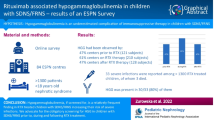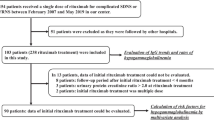Abstract
Background
Hypogammaglobulinemia is a major adverse effect from rituximab. However, the association between rituximab-induced hypogammaglobulinemia and infection frequency is unknown.
Methods
Patients who received rituximab for complicated nephrotic syndrome between February 2006 and October 2020 were enrolled in this retrospective observational study. Infections requiring antibacterial or antiviral agents or hospitalization were identified, and the characteristics of infections were compared according to infection type.
Results
One hundred and forty patients were enrolled. Fifty infection events were detected in 36 patients, 45 infection events in 32 patients required hospitalization, and 1 severe infection event required intensive care unit admission. In eight patients who developed severe hypogammaglobulinemia (serum IgG level < 200 mg/dL) for more than 1 year after rituximab treatment, eight infections occurred in six patients; six of these infections did not occur during the period of severe hypogammaglobulinemia. Febrile neutropenia accounted for 54.2% (13/24) of all infections among the patients with hypogammaglobulinemia. The incidence of infections was 0.028 (95% confidence interval = 0.017–0.448), 0.071 (95% [CI] = 0.041–0.114), and 0.096 (95% [CI] = 0.019–0.282) patient-years in patients with normal serum IgG levels and those with mild and severe hypogammaglobulinemia, respectively. Immunoglobulin replacement therapy was not administered to any patients except for the treatment of infection.
Conclusions
Our results showed no statistically significant association between hypogammaglobulinemia severity and infection rate. In addition, the frequency of infection was relatively low even in patients with severe hypogammaglobulinemia, suggesting that immunoglobulin replacement therapy may not be necessary for rituximab-treated patients with severe hypogammaglobulinemia.
Graphical abstract
A higher resolution version of the Graphical abstract is available as Supplementary information.



Similar content being viewed by others
Data availability
The data from this study are available from the corresponding author upon reasonable request.
Code availability
Not applicable.
References
Kamei K, Ishikura K, Sako M, Aya K, Tanaka R, Nozu K, Kaito H, Nakanishi K, Ohtomo Y, Miura K, Takahashi S, Morimoto T, Kubota W, Ito S, Nakamura H, Iijima K (2017) Long-term outcome of childhood-onset complicated nephrotic syndrome after a multicenter, double-blind, randomized, placebo-controlled trial of rituximab. Pediatr Nephrol 32:2071–2078. https://doi.org/10.1007/s00467-017-3718-0
Iijima K, Sako M, Nozu K, Mori R, Tuchida N, Kamei K, Miura K, Aya K, Nakanishi K, Ohtomo Y, Takahashi S, Tanaka R, Kaito H, Nakamura H, Ishikura K, Ito S, Ohashi Y (2014) Rituximab for childhood-onset, complicated, frequently relapsing nephrotic syndrome or steroid-dependent nephrotic syndrome: a multicentre, double-blind, randomised, placebo-controlled trial. Lancet 384:1273–1281. https://doi.org/10.1016/S0140-6736(14)60541-9
Trautmann A, Vivarelli M, Samuel S, Gipson D, Sinha A, Schaefer F, Hui NK, Boyer O, Saleem MA, Feltran L, Muller-Deile J, Becker JU, Cano F, Xu H, Lim YN, Smoyer W, Anochie I, Nakanishi K, Hodson E, Haffner D, International Pediatric Nephrology Association (2020) IPNA clinical practice recommendations for the diagnosis and management of children with steroid-resistant nephrotic syndrome. Pediatr Nephrol 35:1529–1561. https://doi.org/10.1007/s00467-020-04519-1
Kelesidis T, Daikos G, Boumpas D, Tsiodras S (2011) Does rituximab increase the incidence of infectious complications? A narrative review. Int J Infect Dis 15:e2–e16. https://doi.org/10.1016/j.ijid.2010.03.025
Christou EAA, Giardino G, Worth A, Ladomenou F (2017) Risk factors predisposing to the development of hypogammaglobulinemia and infections post-rituximab. Int Rev Immunol 36:352–359. https://doi.org/10.1080/08830185.2017.1346092
Barmettler S, Ong MS, Farmer JR, Choi H, Walter J (2018) Association of immunoglobulin levels, infectious risk, and mortality with rituximab and hypogammaglobulinemia. JAMA Netw Open 1:e184169. https://doi.org/10.1001/jamanetworkopen.2018.4169
Worch J, Makarova O, Burkhardt B (2015) Immunreconstitution and infectious complications after rituximab treatment in children and adolescents: what do we know and what can we learn from adults? Cancers (Basel) 7:305–328. https://doi.org/10.3390/cancers7010305
Kavcic M, Fisher BT, Seif AE, Li Y, Huang YS, Walker D, Aplenc R (2013) Leveraging administrative data to monitor rituximab use in 2875 patients at 42 freestanding children’s hospitals across the United States. J Pediatr 162:1252–1258. https://doi.org/10.1016/j.jpeds.2012.11.038
Inoki Y, Kamei K, Nishi K, Sato M, Ogura M, Ishiguro A (2022) Incidence and risk factors of rituximab-associated hypogammaglobulinemia in patients with complicated nephrotic syndrome. Pediatr Nephrol 37:1057–1066. https://doi.org/10.1007/s00467-021-05304-4
Parmentier C, Delbet JD, Decramer S, Boyer O, Hogan J, Ulinski T (2020) Immunoglobulin serum levels in rituximab-treated patients with steroid-dependent nephrotic syndrome. Pediatr Nephrol 35:455–462. https://doi.org/10.1007/s00467-019-04398-1
Fujinaga S, Tomii Y (2020) Profound effect of post-rituximab mycophenolate mofetil administration for persistent hypogammaglobulinemia in young children with steroid-dependent nephrotic syndrome. Clin Exp Nephrol 24:386–387. https://doi.org/10.1007/s10157-020-01858-z
Marzuillo P, Guarino S, Esposito T, Sessa AD, Orsini SI, Capalbo D, Giudice EMd, Manna AL (2019) Rituximab-induced IgG hypogammaglobulinemia in children with nephrotic syndrome and normal pre-treatment IgG values. World J Clin Cases 7:1021–1027. https://doi.org/10.12998/wjcc.v7.i9.1021
Fujinaga S, Ozawa K, Sakuraya K, Yamada A, Shimizu T (2016) Late-onset adverse events after a single dose of rituximab in children with complicated steroid-dependent nephrotic syndrome. Clin Nephrol 85:340–345. https://doi.org/10.5414/CN108835
Khojah AM, Miller ML, Klein-Gitelman MS, Curran ML, Hans V, Pachman LM, Fuleihan RL (2019) Rituximab-associated hypogammaglobulinemia in pediatric patients with autoimmune diseases. Pediatr Rheumatol Online J 17:61. https://doi.org/10.1186/s12969-019-0365-y
Irie E, Shirota Y, Suzuki C, Tajima Y, Ishizawa K, Kameoka J, Harigae H, Ishii T (2010) Severe hypogammaglobulinemia persisting for 6 years after treatment with rituximab combined chemotherapy due to arrest of B lymphocyte differentiation together with alteration of T lymphocyte homeostasis. Int J Hematol 91:501–508. https://doi.org/10.1007/s12185-010-0528-6
Wijetilleka S, Mukhtyar C, Jayne D, Ala A, Bright P, Chinoy H, Harper L, Kazmi M, Kiani-Alikhan S, Li C, Misbah S, Oni L, Price-Kuehne F, Salama A, Workman S, Wrench D, Karim MY (2019) Immunoglobulin replacement for secondary immunodeficiency after B-cell targeted therapies in autoimmune rheumatic disease: systematic literature review. Autoimmun Rev 18:535–541. https://doi.org/10.1016/j.autrev.2019.03.010
Casulo C, Maragulia J, Zelenetz AD (2013) Incidence of hypogammaglobulinemia in patients receiving rituximab and the use of intravenous immunoglobulin for recurrent infections. Clin Lymphoma Myeloma Leuk 13:106–111. https://doi.org/10.1016/j.clml.2012.11.011
Agarwal S, Cunningham-Rundles C (2007) Assessment and clinical interpretation of reduced IgG values. Ann Allergy Asthma Immunol 99:281–283. https://doi.org/10.1016/S1081-1206(10)60665-5
Sato M, Ito S, Ogura M, Kamei K, Miyairi I, Miyata I, Higuchi M, Matsuoka K (2013) Atypical Pneumocystis jiroveci pneumonia with multiple nodular granulomas after rituximab for refractory nephrotic syndrome. Pediatr Nephrol 28:145–149. https://doi.org/10.1007/s00467-012-2286-6
Mariette X, Gottenberg JE, Ravaud P, Combe B (2011) Registries in rheumatoid arthritis and autoimmune diseases: data from the French registries. Rheumatology (Oxford) 50:222–229. https://doi.org/10.1093/rheumatology/keq368
Shah S, Jaggi K, Greenberg K, Geetha D (2017) Immunoglobulin levels and infection risk with rituximab induction for anti-neutrophil cytoplasmic antibody-associated vasculitis. Clin Kidney J 10:470–474. https://doi.org/10.1093/ckj/sfx014
Marco H, Smith RM, Jones RB, Guerry MJ, Catapano F, Burns S, Chaudhry AN, Smith KG, Jayne DR (2014) The effect of rituximab therapy on immunoglobulin levels in patients with multisystem autoimmune disease. BMC Musculoskelet Disord 15:178. https://doi.org/10.1186/1471-2474-15-178
Keystone E, Fleischmann R, Emery P, Furst DE, van Vollenhoven R, Bathon J, Dougados M, Baldassare A, Ferraccioli G, Chubick A, Udell J, Cravets MW, Agarwal S, Cooper S, Magrini F (2007) Safety and efficacy of additional courses of rituximab in patients with active rheumatoid arthritis: an open-label extension analysis. Arthritis Rheum 56:3896–3908. https://doi.org/10.1002/art.23059
Kearsley-Fleet L, Sampath S, McCann LJ, Baildam E, Beresford MW, Davies R, De Cock D, Foster HE, Southwood TR, Thomson W, Hyrich KL (2019) Use and effectiveness of rituximab in children and young people with juvenile idiopathic arthritis in a cohort study in the United Kingdom. Rheumatology (Oxford) 58:331–335. https://doi.org/10.1093/rheumatology/key306
Tambralli A, Beukelman T, Cron RQ, Stoll ML (2015) Safety and efficacy of rituximab in childhood-onset systemic lupus erythematosus and other rheumatic diseases. J Rheumatol 42:541–546. https://doi.org/10.3899/jrheum.140863
Alfakeekh K, Azar M, Sowailmi BA, Alsulaiman S, Makdob SA, Omair A, Albanyan E, Bawazeer MS (2019) Immunosuppressive burden and risk factors of infection in primary childhood nephrotic syndrome. J Infect Public Health 12:90–94. https://doi.org/10.1016/j.jiph.2018.09.006
Wei CC, Yu IW, Lin HW, Tsai AC (2012) Occurrence of infection among children with nephrotic syndrome during hospitalizations. Nephrology (Carlton) 17:681–688. https://doi.org/10.1111/j.1440-1797.2012.01650.x
Jain S, Williams DJ, Arnold SR, Ampofo K, Bramley AM, Reed C, Stockmann C, Anderson EJ, Grijalva CG, Self WH, Zhu Y, Patel A, Hymas W, Chappell JD, Kaufman RA, Kan JH, Dansie D, Lenny N, Hillyard DR, Haynes LM, Levine M, Lindstrom S, Winchell JM, Katz JM, Erdman D, Schneider E, Hicks LA, Wunderink RG, Edwards KM, Pavia AT, McCullers JA, Finelli L, CDC EPIC Study Team (2015) Community-acquired pneumonia requiring hospitalization among U.S. children. N Engl J Med 372:835–845. https://doi.org/10.1056/NEJMoa1405870
Sun Y, Li H, Pei Z, Wang S, Feng J, Xu L, Gao P, Cao B, Zhan S (2020) Incidence of community-acquired pneumonia in urban China: a national population-based study. Vaccine 38:8362–8370. https://doi.org/10.1016/j.vaccine.2020.11.004
Furst DE (2009) Serum immunoglobulins and risk of infection: how low can you go? Semin Arthritis Rheum 39:18–29. https://doi.org/10.1016/j.semarthrit.2008.05.002
Looney RJ, Srinivasan R, Calabrese LH (2008) The effects of rituximab on immunocompetency in patients with autoimmune disease. Arthritis Rheum 58:5–14. https://doi.org/10.1002/art.23171
Roberts DM, Jones RB, Smith RM, Alberici F, Kumaratne DS, Burns S, Jayne DR (2015) Immunoglobulin G replacement for the treatment of infective complications of rituximab-associated hypogammaglobulinemia in autoimmune disease: a case series. J Autoimmun 57:24–29. https://doi.org/10.1016/j.jaut.2014.11.004
Department of Health and Social Care (2011) Clinical guidelines for immunoglobulin use: second edition update. https://www.gov.uk/government/publications/clinical-guidelines-for-immunoglobulin-use-second-edition-update. Accessed 30 October 2021
McAtee CL, Lubega J, Underbrink K, Curry K, Msaouel P, Barrow M, Muscal E, Lotze T, Srivaths P, Forbes LR, Allen C, Bernhardt MB (2021) Association of rituximab use with adverse events in children, adolescents, and young adults. JAMA Netw Open 4:e2036321. https://doi.org/10.1001/jamanetworkopen.2020.36321
Acknowledgements
The authors would like to thank Dr. Chie Nagata at the National Center for Child Health and Development for her advice on statistical analysis. The authors would also like to express their gratitude to Drs. Shuichi Ito and Kenji Ishikura for their contributions to our clinical practice.
Author information
Authors and Affiliations
Contributions
All authors are physicians who treated the patients in this study. Yuta Inoki conducted the study, collected the clinical and laboratory data, and wrote the manuscript; Kentaro Nishi, Mai Sato, and Masao Ogura reviewed and edited the manuscript; Koichi Kamei, the corresponding author, supervised the work and revised the manuscript. All authors read and approved the final manuscript.
Corresponding author
Ethics declarations
Ethics approval
The study was approved by the Ethics Committee of the National Center for Child Health and Development (approval number: 2021–169).
Consent to participate
Informed consent regarding participation was exempted in accordance with the principles of the Declaration of Helsinki and the ethical guidelines issued by the Ministry of Health, Labor, and Welfare, Japan.
Consent for publication
Informed consent for publication was exempted in accordance with the guidelines.
Conflict of interest
Koichi Kamei has obtained research funding from Public Foundation of Vaccination Research Center, the Terumo Foundation for Life Sciences and Arts, and Taiju Life Social Welfare Foundation; donations from Chugai Pharmaceutical Co. Ltd., Astellas Pharma Inc., Ono Pharmaceutical Co., Teijin Pharma Ltd., Shionogi Co. Ltd., and Otsuka Pharmaceutical Co. Ltd.; and lecture fees from Tanabe Mitsubishi Pharma, Baxter Ltd., and Zenyaku Kogyo Co. Ltd. All other authors have no potential conflicts of interests to disclose.
Additional information
Publisher's note
Springer Nature remains neutral with regard to jurisdictional claims in published maps and institutional affiliations.
Supplementary Information
Below is the link to the electronic supplementary material.
Rights and permissions
About this article
Cite this article
Inoki, Y., Nishi, K., Sato, M. et al. The association between hypogammaglobulinemia severity and infection risk in rituximab-treated patients with childhood-onset idiopathic nephrotic syndrome. Pediatr Nephrol 38, 451–460 (2023). https://doi.org/10.1007/s00467-022-05652-9
Received:
Revised:
Accepted:
Published:
Issue Date:
DOI: https://doi.org/10.1007/s00467-022-05652-9




